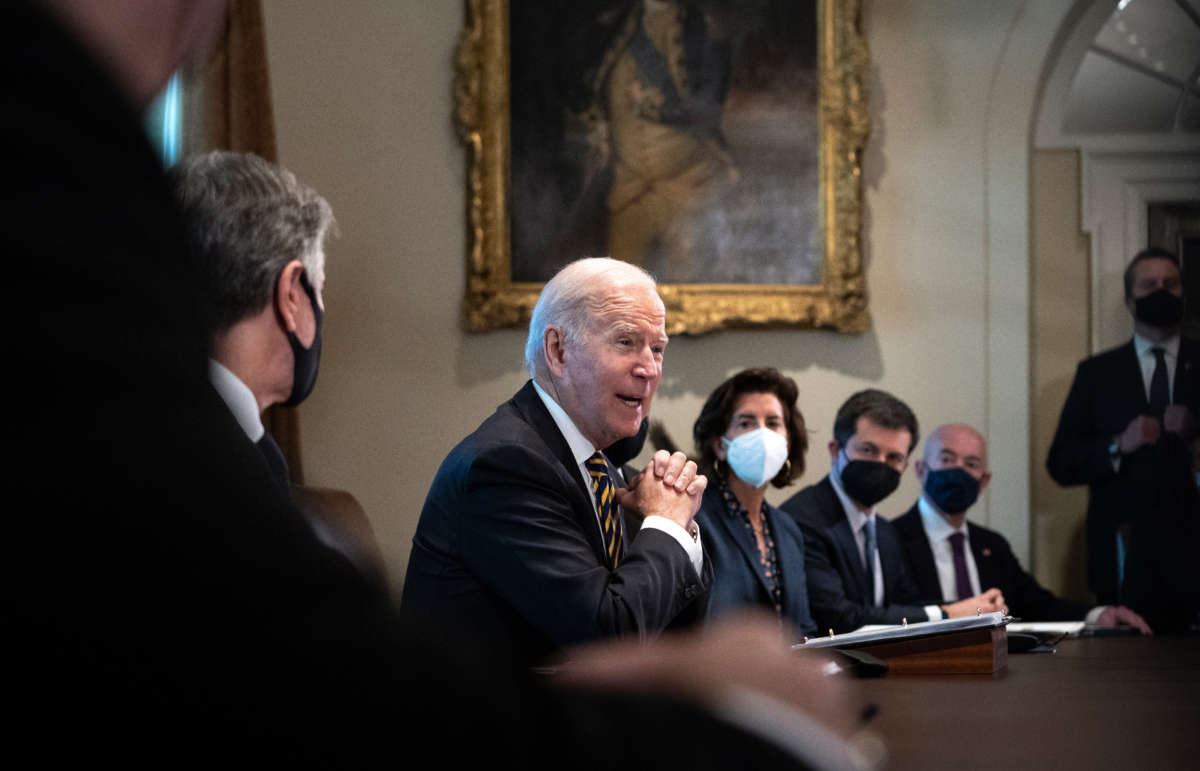As President Joe Biden is set to sign the bipartisan infrastructure bill into law on Monday, House Democrats are aiming to pass the reconciliation bill before Congress goes into recess for Thanksgiving.
Democrats in the House feel like they’re on the verge of a breakthrough in negotiations this week after plans to tie the infrastructure and reconciliation bills fell apart thanks to the efforts of conservative Democrats and corporate lobbyists. But a Senate vote may still be weeks away as right-wing holdouts Senators Joe Manchin (D-West Virginia) and Kyrsten Sinema (D-Arizona) have yet to commit to voting for the bill.
Instead, the Senate will focus on the massive defense authorization bill this week, according to a letter to colleagues from Senate Majority Leader Chuck Schumer (D-New York). The bill is slated to give the Pentagon $725 billion for next year, spending a total of $778 billion on defense.
Still, Democrats say that the reconciliation bill, which could potentially include prescription drug price negotiation, paid leave, child care funding and coverage for hearing under Medicare, will pass before Christmas. It’s unclear which of these proposals will make it through additional negotiations, as Manchin and Sinema, along with conservative representatives like Rep. Josh Gottheimer (D-New Jersey), have already altered the bill nearly beyond recognition over the past few months.
Meanwhile, President Joe Biden is scheduled to sign the Infrastructure Investment and Jobs Act this afternoon, a bill that progressives and experts say is inadequate to address the infrastructure and climate issues that the nation faces.
In hopes of boosting his approval ratings, Biden will sign the bill at a signing ceremony. Despite being a supposed win for the president, the infrastructure bill has not yet delivered the approval boost that officials have hoped for; a Washington Post-ABC News poll conducted just as Congress passed the infrastructure bill found that Biden’s approval ratings are continuing a months-long downward trend, with only 41 percent of those polled saying that they approve of Biden’s job performance.
That same poll largely found majority support for the bipartisan infrastructure and reconciliation bills. Sixty three percent of those polled said they supported the infrastructure bill; 58 percent said they were supportive of the reconciliation bill. Throughout this year, polling on various forms of both bills had similar results, showing that most Americans supported the investments and the original $3.5 trillion price tag.
Thanks to months of negotiations from Manchin and Sinema, the reconciliation bill has been cut in half to $1.75 trillion over 10 years — meaning that reconciliation bill spending per annum will amount to a little under a fifth of the spending that is slated for defense over the next fiscal year. Despite successfully slashing the reconciliation bill, however, Manchin and Sinema have not yet committed to voting for the bill.
Even though Manchin has already gotten the Clean Electricity Payment Program thrown out, successfully sabotaging the country’s main mechanism to cut emissions over the next decades, he reportedly still has reservations about the climate portions of the bill.
The coal baron has said that he won’t support any proposals that would regulate the fossil fuel industry. He is now working to get a proposal to regulate methane out of the bill, even though Democrats already shoved a $775 million oil-and-gas subsidy into the methane proposal to appease him. It’s unclear if he’s also fighting for the subsidy to be pushed out, though Manchin has been fighting for at least $121 billion in subsidies for the bloated, polluting and climate denying industry.
As negotiations drag on, Democrats have found themselves facing potentially long odds of winning the midterm elections, especially following this month’s defeats in places like Virginia. To avoid losing ground in 2022, progressive lawmakers say that Democrats need to appeal to the public directly by standing behind massively popular proposals like prescription drug price negotiation.
“Democrats need to reassess their strategy,” Rep. Alexandria Ocasio-Cortez (D-New York) told The Hill. “We need to have legislation that actually, forcefully delivers for working people.”
Join us in defending the truth before it’s too late
The future of independent journalism is uncertain, and the consequences of losing it are too grave to ignore. To ensure Truthout remains safe, strong, and free, we need to raise $46,000 in the next 7 days. Every dollar raised goes directly toward the costs of producing news you can trust.
Please give what you can — because by supporting us with a tax-deductible donation, you’re not just preserving a source of news, you’re helping to safeguard what’s left of our democracy.
